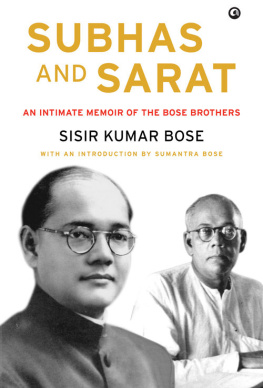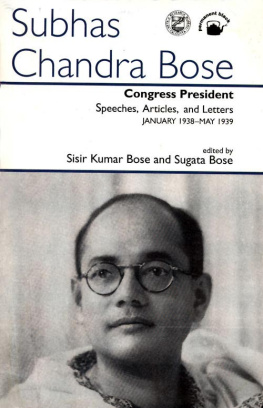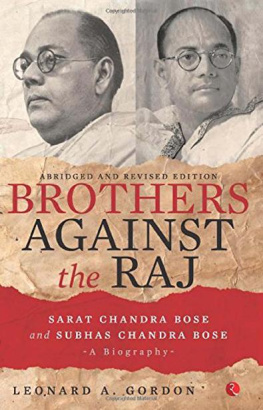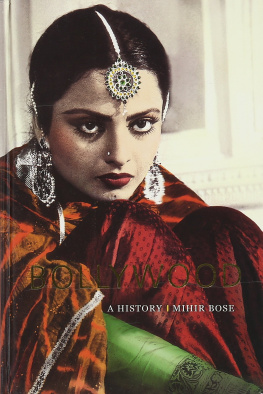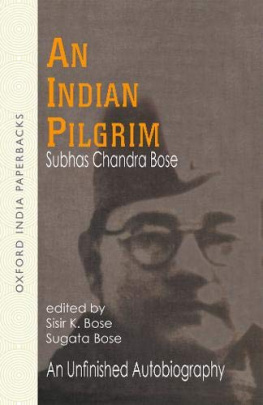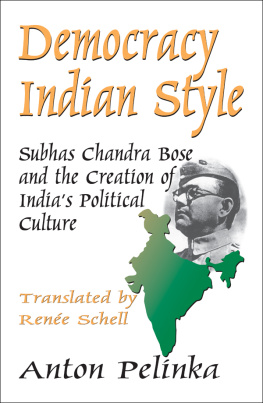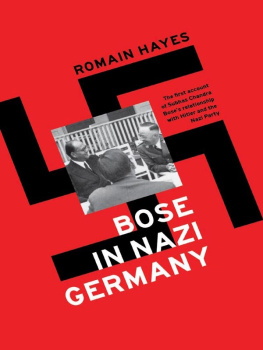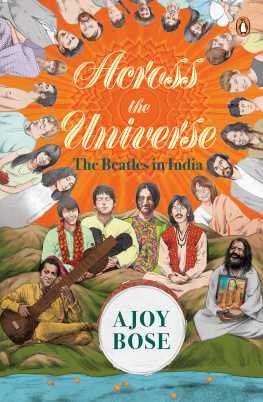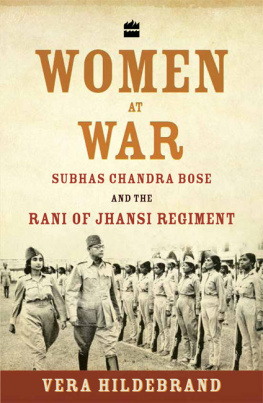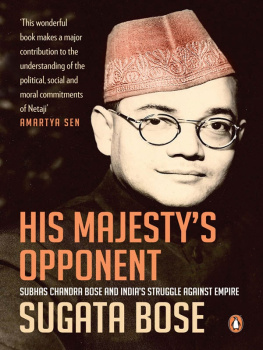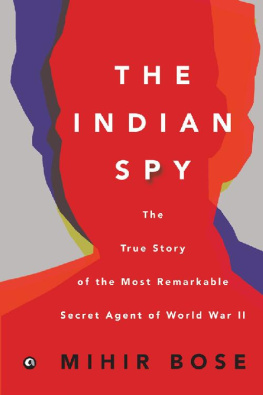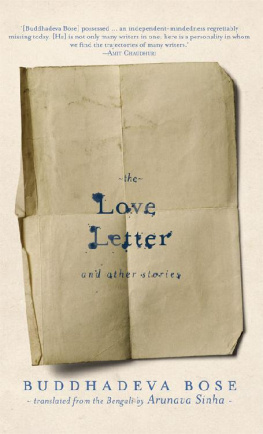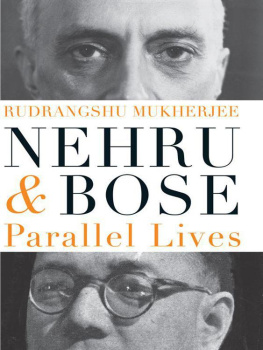Sisir Kumar Bose - Subhas and Sarat: An Intimate Memoir of the Bose Brothers
Here you can read online Sisir Kumar Bose - Subhas and Sarat: An Intimate Memoir of the Bose Brothers full text of the book (entire story) in english for free. Download pdf and epub, get meaning, cover and reviews about this ebook. year: 2016, publisher: Aleph Book Company, genre: Non-fiction. Description of the work, (preface) as well as reviews are available. Best literature library LitArk.com created for fans of good reading and offers a wide selection of genres:
Romance novel
Science fiction
Adventure
Detective
Science
History
Home and family
Prose
Art
Politics
Computer
Non-fiction
Religion
Business
Children
Humor
Choose a favorite category and find really read worthwhile books. Enjoy immersion in the world of imagination, feel the emotions of the characters or learn something new for yourself, make an fascinating discovery.
- Book:Subhas and Sarat: An Intimate Memoir of the Bose Brothers
- Author:
- Publisher:Aleph Book Company
- Genre:
- Year:2016
- Rating:3 / 5
- Favourites:Add to favourites
- Your mark:
- 60
- 1
- 2
- 3
- 4
- 5
Subhas and Sarat: An Intimate Memoir of the Bose Brothers: summary, description and annotation
We offer to read an annotation, description, summary or preface (depends on what the author of the book "Subhas and Sarat: An Intimate Memoir of the Bose Brothers" wrote himself). If you haven't found the necessary information about the book — write in the comments, we will try to find it.
Sisir Kumar Bose: author's other books
Who wrote Subhas and Sarat: An Intimate Memoir of the Bose Brothers? Find out the surname, the name of the author of the book and a list of all author's works by series.
Subhas and Sarat: An Intimate Memoir of the Bose Brothers — read online for free the complete book (whole text) full work
Below is the text of the book, divided by pages. System saving the place of the last page read, allows you to conveniently read the book "Subhas and Sarat: An Intimate Memoir of the Bose Brothers" online for free, without having to search again every time where you left off. Put a bookmark, and you can go to the page where you finished reading at any time.
Font size:
Interval:
Bookmark:

ALEPH BOOK COMPANY
An independent publishing firm
promoted by Rupa Publications India
First published in India in 2016 by
Aleph Book Company
7/16 Ansari Road, Daryaganj
New Delhi 110 002
Copyright Sumantra Bose 2016
All rights reserved.
The views and opinions expressed in this book are the authors own and the facts are as reported by him/her which have been verified to the extent possible, and the publishers are not in any way liable for the same.
While every effort has been made to trace copyright holders and obtain permission, this has not been possible in all cases; any omissions brought to our attention will be remedied in future editions.
No part of this publication may be reproduced, transmitted, or stored in a retrieval system, in any form or by any means, without permission in writing from Aleph Book Company.
eISBN: 978-93-84067-74-8
This book is sold subject to the condition that it shall not, by way of trade or otherwise, be lent, resold, hired out, or otherwise circulated without the publishers prior consent in any form of binding or cover other than that in which it is published.
To Krishna, my wife and soulmate
This book should have been published many years ago. It is a uniquely authentic account of the Bose family of Bengal and Indiawhose most famous son is Netaji Subhas Chandra Boseand its role in Indias struggle for freedom.
The author, Sisir Kumar Bose (1920-2000), was the son of Netajis older brother Sarat Chandra Bose and his wife Bivabati Bose. Sarat, perhaps Indias most eminent barrister for a quarter-century, from about the mid-1920s till his death in 1950, was also a nationalist leader of standing throughout that time. He was president of the Bengal Congress in the second half of the 1930s, a member of the Congress Working Committee (CWC) in the late 1930s, the leader of the Congress party in the Central Legislative Assembly in Delhi in 1946 and a minister in the interim government of India formed in August 1946. He was also his younger brother Subhass closest confidant and most resolute supporter.
When Netaji was still a child, Saratolder by seven yearswas virtually the only member of the large Bose family to detect something truly special in the boy. The closeness they developed while growing up became ever deeper and stronger over the subsequent decades, as the two brothers struggled and suffered together in the freedom movement. Their personal bond and political camaraderie defined the Bose familys public role, a roller-coaster journey of triumphs and travails over three decades. Netaji was also extremely close to Sarats wife Bivabatishe was one of the most important women in his life alongside his mother Prabhabati, his political guru Deshbandhu Chittaranjan Dass wife Basanti Devi, and his Austrian wife Emilie Schenkl.
Sisir was born to Sarat and Bivabati just as Indias anti-colonial struggle became a mass movement at the beginning of the 1920s. He was one when his uncle resigned from the Indian Civil Service in 1921 and chose the hard life of a full-time freedom fighter. He was four when his uncle was arrested for the second time in late 1924 and taken away to Burma to be imprisoned, and barely twelve when his father was arrested in early 1932 and held in detention until mid-1935. Sisir literally grew up with Indias freedom struggle. His clear memories of that struggle and his familys role therein date to 1927, from the time he was seven, although he recalls sketchy memories of episodes from 1924-25.
Sisir offers an extraordinarily intimate account of the extended Bose family, with its many characters and personalities, in a style often enlivened with wit and humour. But the core of his narrative is extremely serious and sometimes sombre, because this family history is really an eyewitness record of Indias long and difficult struggle for freedom, as seen by a young person whose father and uncle devoted their lives, heart and soul, to that struggle. As he writes in the concluding passages of this book: Subhas and Sarat were sons of the Bose family only nominally. They were really sons of Mother India. All the people of India, hundreds of millions of men, women and children, were as much their kith and kin as we. The two brothers made the countrys sorrow their own and sacrificed their lives for its liberation and redemption.
This book recounts Sisirs ringside view of the familial-cum-national struggle from the late 1920s to the end-1930s. In 1940, however, his vantage point of the struggle undergoes a tectonic shift, from close observer to active participant. This happened on a quiet Sunday afternoon in early December of 1940, when his Uncle Subhas (whom he addressed as Rangakakababu in Bengali), who had just been released from a spell in prison after going on a fast unto death, called Sisir over to 38/2, Elgin Road, the family mansion built by Netajis father Janakinath Bose in Calcutta in 1909 (the house was renamed Netaji Bhawan and dedicated to public and national purposes by Sarat Bose in 1946, and since 1957 it has been the home of the Netaji Research Bureau, founded by Sisir).
Lying in bed in his room, the stormy petrel of Indias independence movement asked his quiet, shy nephewwhom he affectionately but accurately called the silent boya deceptively simple question in Bengali: Amar ekta kaj korte parbe? (Can you do something for me?). Sisir thought he might have to post a letter or a telegram, or look after a visiting guest. In fact, Subhas Chandra Bose was asking his 20-year-old nephew to help him plan and execute his escape from India, so he could take advantage of World War II to launch Indias final battle for liberation from abroad.
Sisir Kumar Boses life was transformed that winter afternoon. This book includes the thrilling, blow-by-blow account of the planning and execution of the escape, during which Sisir drove his uncle in the dead of night from the Elgin Road house to the Gomoh railway junction in Bihar (now in Jharkhand), where Netaji boarded the Kalka Mail to Peshawar, from where he travelled to Kabul. The last time Sisir saw his uncle was around 1 a.m. on the night of 17-18 January 1941 at the Gomoh stationnow Netaji Subhas Chandra Bose Gomoh Junction, 320 kilometres from Calcutta.
Netaji was never to return to India but he had transformed his quiet and introverted young nephew into a fearless freedom fighter. The silent boymy father Sisir Bosecontinued to contribute to the freedom struggle as the war progressed and his uncle travelled by submarine for 93 days in the first half of 1943 from Europe to South-east Asia, where he would assume the leadership of the Indian National Army and form the Provisional Government of Free India. It took the British government and its intelligence services quite some time to crack the escape and find out the full extent of my fathers role, but eventually they more or less did so.
My father was arrested for the first time from his homeSarat Boses house, 1, Woodburn Park, round the corner from the Elgin Road housein September 1942, after being grievously injured in a clash with the police in central Calcutta during the Quit India demonstrations of August 1942. Lodged in Calcuttas Presidency Jail, he was moved from there to the Calcutta Medical College Hospitalwhere he was a studentafter falling critically ill with typhoid fever. Discharged towards the end of 1942, he was put under a stringent home internment order for a year, until early 1944. Towards the end of this period of home internment, he was contacted by men who had arrived secretly in India from South-east Asia to prepare the home front as the INA readied to advance into Indias north-east from Burma. Sisir plunged into the work of coordinating Netajis underground network in Bengal and that story forms another thrilling part of this book.
Font size:
Interval:
Bookmark:
Similar books «Subhas and Sarat: An Intimate Memoir of the Bose Brothers»
Look at similar books to Subhas and Sarat: An Intimate Memoir of the Bose Brothers. We have selected literature similar in name and meaning in the hope of providing readers with more options to find new, interesting, not yet read works.
Discussion, reviews of the book Subhas and Sarat: An Intimate Memoir of the Bose Brothers and just readers' own opinions. Leave your comments, write what you think about the work, its meaning or the main characters. Specify what exactly you liked and what you didn't like, and why you think so.

